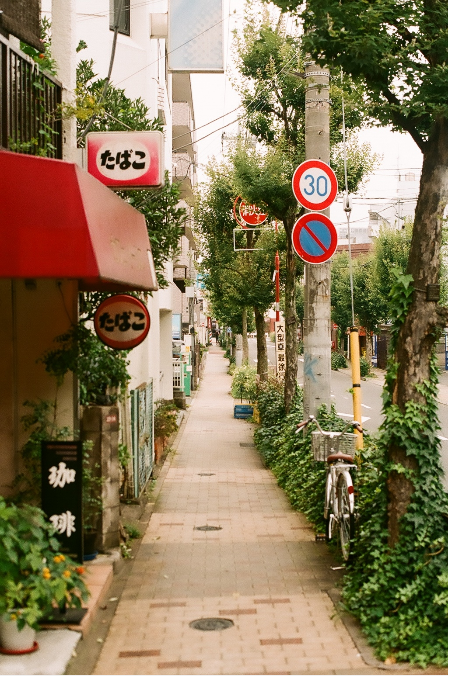
japan's a place, and it exists, and there's people that live there. Not many know about what it's like. How is bobbing along on this rock with 125 million other pensioners?
It's hard to define even after 4 years with total fluency. It is effortless to say that your expectations are going to be a useless pool of fantasy.
conversations, punchlines
I don't know if this is isolated to the people I choose to surround myself with but the visceral thrill of conversations comes from dissection. Picking apart introspection, comparing perspectives. But as it occurs to me the punchline in Japan often seems to be hypotheticals. The conversations are less puerile but also less interesting.
interactions
Any non-fluent foreign-born resident will be able to tell you about "the look" during a conversation with a stranger, the realization that normal communication won't be happening. Any high-context society in practical terms reveals itself like a choreographed dance. How much agency is behind these reciprocal social contracts of pretending to reject gifts out of modesty or half-heartedly inviting someone out next time? The fundamental question, one that every non-native japanese speaker asks themselves is what degree these motions are etiquette, courtesy, or whether they carry genuine sentiments behind them. Ultimately it doesn't really matter. Even to the japanese the line between expectations and sensibilities always bends under every new headline about hard-headed teachers or laughably inconsequential policing.
It's important to remember these are people who lived as tenant farmers deep in the mountains for millenia, eating, working, and sleeping with people in villages where everyone shared the same last name. In the city the sort of hush-hush small town politics neccessitated by all kinds of proximity combines with the sensation of being surrounded by thousands of people.
housing
Houses are transient. When buying property it's common for the land and building costs to be about equal. Inexpensive housing gets torn down and rebuilt fast, every 5 years cityscapes radically change. The weather is relentless, post 60's earthquake standards are a perennial barrier, and there's little financial incentives to be sentimental of a house younger than 50 years. Go out to the countryside and there's gorgeous wooden houses that have been built by grandads. Abandoned properties are becoming a larger issue, unrentable because of earthquake regulations and undemolishable due to cost.
as a result social mobility through inheriting property doesn't exist, many parents' houses often in the remote countryside being a burdensome financial black box instead of capital. Derelict abandoned buildings are such an issue that government has introduced punitive fines and sentencing for people who don't register for property inheritance
houses into the 80's are uninsulated and very drafty. the standard arrangement was for plenty of ventilation to bring in wind during the summers and vent out carbon monoxide from charcoal hearths or kerosene heaters during winter - nothing like the sophisticated in-floor heating in Korea. Today central heating is a rarity and the high cost of electricity means the limited households that own dryers opt for LNG-powered units. the prevalence of both earthquakes and the edo-era anxiety for fires means masonry houses are illegal and arsons bring heavy sentences.
imports
japanese pop culture isn't defined by american imports like people seem to think. The only real post-occupation cross-cultural contamination was at the height of beatlemania. talk to any ossan over 50 and they'll tell you about listening to california dreamin' and bridge over troubled water on Koss headphones until they went deaf. Today it's staggering how disconnected the two countries are. the top youtube result of "breaking bad" in japanese is a video with 16,000 views. I've never met someone who has watched king of the hill or the simpsons, star trek is an unknown. There are plenty of big bang theory fans though, god help me.
For music the real rift started appearing in the 80's with glam rock and finally punk music extinguishing the coals. Lately online TV streaming has been closing the gap but it's a trickle, the explosions in popularity of media that is inherently hard to access doesn't happen often
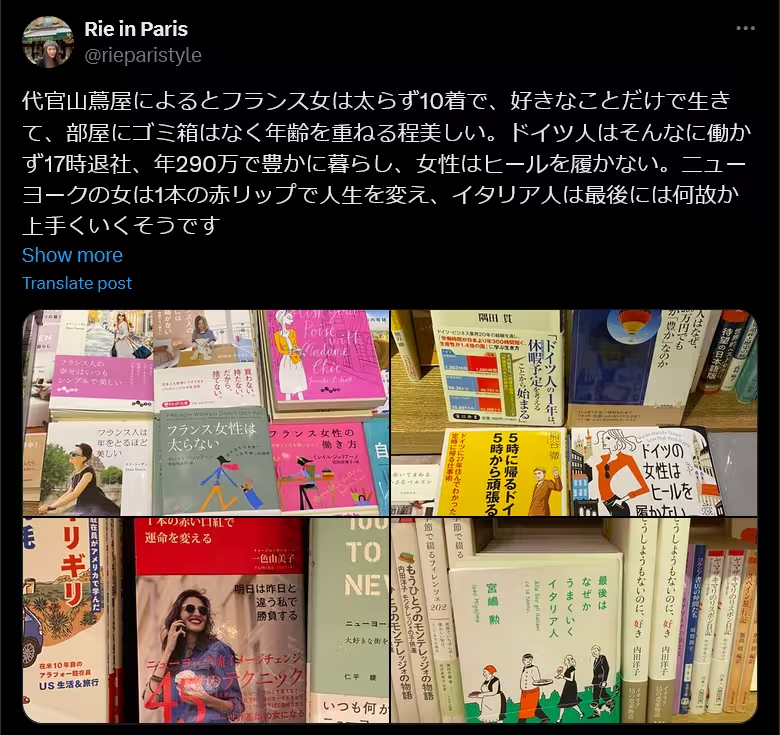 According to the bookstore at Daikanyama French women don't get fat and have 10 outfits, live according to what they like, don't have trashbins in their rooms and get more beautiful as they age. Germans don't work that much and clock out at 5pm, live well on €25,000 a year, their women don't wear heels. New York women change their life with one red lipstick, Italians inexplicably see success in the end.
According to the bookstore at Daikanyama French women don't get fat and have 10 outfits, live according to what they like, don't have trashbins in their rooms and get more beautiful as they age. Germans don't work that much and clock out at 5pm, live well on €25,000 a year, their women don't wear heels. New York women change their life with one red lipstick, Italians inexplicably see success in the end.
 I wonder what bookstores overseas are like. Must be like "the Japanese live long because of ikigai, or karoshi while constantly nemawashing."
I wonder what bookstores overseas are like. Must be like "the Japanese live long because of ikigai, or karoshi while constantly nemawashing."
For euros it's a different story. The naive xenophilia goes both ways, except instead of some national character the japanese fascination continues to be alternate ways of living. The incomplete fantasies of living like a rural italian fisherman lounging around for most of the time or British schools "excelling" at preventative anti-bullying measures. The japanese love the dutch or french in the same hypothetical way you like movies you've never watched.
identity and foreigners
As a high-context culture people will be inevitably suspicious of those who don't follow the usual interactions. Autistic people don't do well in Japan. Those who are half-Japanese, japanese-brazilian, or Japan-raised exist in amorphous social categories to the general public. Unlike France or the UK, national identity is inseparable from nationality, not on the basis of some exclusionary rhetoric but outdated norms about what constitutes cultural assimilation. The label "Zainichi" is persistently applied to Korean immigrant populations, many who have lived in Japan since the country's gallivanting colonization phase. The main difference with other countries who insist that it's all behind them is ability for 20th century East Asian immigrants to "pass" in Japan in regards to outward appearance. Some have kept Korean names but chosen Japanese citizenship, others have assimilated completely. Some married Japanese men, at which point their ethnic roots disappear completely on government records. Census figures about foreigner numbers are very blurry as a result. If you're half-Japanese you're not afforded with both privileges.
Being a foreigner is piss easy. Learn how to dispose of trash properly, don't catcall schoolchildren, don't eat on the subway, don't smoke while walking, and Japanese eyes will gloss right over you. Deviate from their expectations and you'll just reinforce very obvious delineating lines between the ingroup and outgroup (you), Ultimately Japan is an island and the social politics that arise from that aren't surprising. Are Hawaiians and Sardinians known for being open and welcoming?
internet
The Japanese internet landscape is strange. Yahoo Answers is somehow still relevant. Twitter is the real juggernaut with 2nd place really up in the air. 2ch is not as lively as the numerous english boards its spawned, there's still a heavy reliance on ancient sakura-hosted personal sites as well as the litany of prepackaged blog sites. I've never felt a particular collective atmosphere in any of them, they all feel relatively insular, personal little things. There's thousands of terrible little congregation sites drawing threads off of 2ch talking about butts and things or vague ghost-written articles about X. It seems to me that twitter is still king, to the disadvantage to me as it's not a terribly legible site to navigate. The uniquely Japanese apprehension in reposting images without consent rules out tumblr as a viable platform too. While the Floridian elderly shuffle around on Facebook spitting minion-adorned vitriol about foreigners, the over 50's in Japan either manage hand-coded blogs or are offline entirely.
anime
Anime otakus for the most part pursue their hobby with the resignation that they will forever huddle in the drudges of society. People keep their head down and try to live normal lives. It's even the fundamental plot point to Otakoi, a group of four anime-watching officeworkers who bond over their hushed collective transgressions like Soviet dissidents. To the mainstream bread-baking horoscope-tracking linen-draped Setagaya housewife, anime otakus exist somewhere inbetween NEETs and child murderers.
It's a far cry from weeaboos who advertise their desires in the same indignance as furries, eager to shamelessly tell everyone that watching pirated anime is their hobby. Anime otakus in Japan act like closeted horsegirls, eager to conceal themselves from the social pogrom. Some series especially ones on Shounen Jump break through the stigma to shake off those connotations, simply becoming another set of faces, another brand. Liking Dragonball Z or Bleach doesn't make you an otaku in the Japanese sense.
nostalgia
While americans are eternally backwards looking, desperately nostalgic for post-war redlined suburbia there's not really a universally agreed finger to point at. The Edo and Taisho eras were the big cultural golden ages but it accompanied the backwards barbarity of unwashed assholes and arranged marriages. Wartime is wartime. The bubble era drowned Japan in cash and name-brand hedonism - the shock of the following recession felt like a reasonable correction to the absurdity of 12% interest rates. The early 2000's was colorful and embarrassing despite the hordes of young men unable to enter the workforce. None quite capture the desperate cultural and economic nostalgia that Americans retain for a single point in time.
Despite the stereotype about confucian elder deference It's a bit of a given that people back then were rough around the edges - everyone's grandfather no doubt stayed busy by playing kick the can, visiting women of affordable virtue, and eating street animals.
Saw a twitter post sacralizing post-war Japan. Which is just odd. It's a bit like fondly looking back on the destitution of post-war Britain. Food rationing for 9 more years, grotty black streets, clouds of smog culling pensioners, if you fantasize about all this you're probably Scottish. There was an elderly woman on TV hoarding rooms of futons as a consequence of her inability to afford any as a child. Looking through 50's photobooks it was common to see children without clothing or shoes standing on dirt roads, towering khaki servicemen scattering sticks of gum like they were street pigeons. Gran refuses to eat kabocha, sweet potato, or bamboo shoots because that's all that was available during rationing.
pride
the majority of Japanese i've met have fillipino-levels of national self-deprecation. English ability, international influence, economic growth, there's plenty of daggers to stab yourself with.
How many Japanese can name an equivalent national author like Shakespeare or Keats is for the English? Does one even exist?
competitiveness
How many appliances by japanese firms do you see at the store? Dashcams? Phones? TVs? Computer components? Appliances?
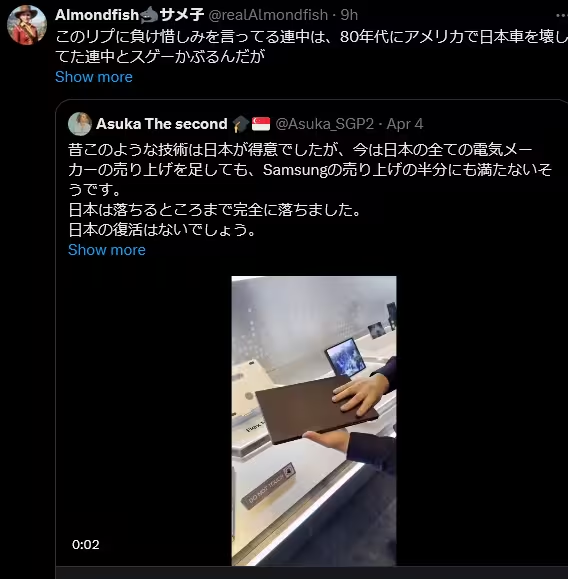 "In the past japan was good at this kind of engineering but if you add up revenue from all japanese electronics firms it doesn't even amount to half of Samsung's. Right now Japan is as low as it can go, there's no coming back."
"In the past japan was good at this kind of engineering but if you add up revenue from all japanese electronics firms it doesn't even amount to half of Samsung's. Right now Japan is as low as it can go, there's no coming back."
"The angry replies to this are just like Americans in the 1980's destroying Japanese cars"
suicide
No, there's no cultural glamour about suicide. There was a r*ddit post claiming that competitive schools advertise by their students' suicide rates and unsurprisingly there were no dissenting comments. If institutional change is anything to go by the Japanese have been kicked into overtime for the past 30 years with furious preventative efforts like banning nicknames at schools or employers begrudgingly offering their employees hotlines. All the signs are out there make it obvious that suicide, like most other countries, carries negative social connotations. That said suicide rates are lower than you think. Far from the world champions of Russia and Korea and was actively trending downwards until coronavirus. You can readily disregard anyone who brings up bushido or kamikaze pilots or whatever.
In other more heartless news Aokigahara has numerous signs put up by the local council that more or less reads "fuck off and die somewhere else" due to the mounting costs of clearing trash and human remains from the forest. So much for glamor.
samurai
The samurai were dicks. Tsujigiri being a great example of their dubious social and moral standing under contemporary eyes. Most people would see themselves as distant progeny of farmers or fishermen, just like how bongs see their immediate ancestors as illiterate farmhands or adolescent chimneysweeps (probably). The Sengoku period portrayed in every annual NHK drama remains a distant novelty about feuding menopausal men who have nothing better to do. No Japanese person sees woodblock prints of Mitsuhide and thinks "my ancestor :)"
There was some USN officer in 2014? that made a cripplingly naive statement to JGSDF troops like "you are Japan's modern samurai" which is a great example of the kind of cultural vacuum samurai lie outside of Japan.
military
True ideologues are a rarity but the stigma about the JSDF endures, an institution typically associated with dead-end bachelors, right-wing idealists a la tatenokai, or gang members. I've had co-workers almost whisper that their partner was in the military, the same apprehension as telling your pinko friends you worked for General Dynamics' Child Evaporation R&D division.
animism
believe it or not people with names like "Blossom SmallMountain" and "Evening Wisteriafield" are deeply animistic despite their near-total estrangement to organized religion.
religion
The sort of people who get into organized religion are especially weird and very eager to tell you about it with an unjapanese vigor. I've had people at temples explain that other buddhist sects are like counterfeit money (unlike their sect). The frequently parodied scripts of "buy this ceramic pot to attain happiness" and "donate your multigenerational earnings to the church" eventually causes politicans to get their backs blown out by other nationalists. Catholicism is strangely associated with a 200-year history of leftism and anti-war dissidence, probably buttressed by the centuries of subjugation and further by the time we atombombed the two most Christian cities in japan.
accessibility
While the US is still the king of disabled infrastructure thanks to the ADA, Japan isn't far behind. Things get more fractious in less affluent areas still haunted with rusting showa-era detritus but the growing silver hordes will no doubt light some fires.
loanwords
There's a few phrases in katakana exclusive to the Japanese internet used generously among embarassing liberal types that I find deeply unsavory.
bread
Lots of bread is full of margarine and rather cake-like probably due to the elderly cohort. Without a proper bakery nearby you have to spend a bit more for proper french bread or pain de campagne. There you can also find deeply satisfying pastries - some achingly francophilic, others with zany ingredients like edamame or curry.
condiments
There's no real border between condiment and ingredient, just like there's no easy word to differentiate the foot and leg.
the gays
There's hordes of drag queens on TV. It undoubtedly originated from kooky palate-cleansing spectacle decades ago, people that were essentially eye-cauterizing court jesters to television producers. They were able to break the rules of anodyne grinning-pundit tv with displays of confident sexuality bleeding into cockgrabbing, deprecation, and straightforward critiques of male sexuality that no one else on stage could. It gradually evolved into thought leaders like Matsuko Deluxe and Miwa Akihiro offering advice to troubled souls on late-night shows, an elevated position that even experienced actors never see. Miwa in particular was the crown jewel of the prestigious new years show Kohaku, the same risk-adverse broadcaster having turned down Kyary pamyu pamyu for her disagreeable image. Drag queens get paired with TV juggernauts like Akashiya Sanma and Tamori when hosting shows and you can sense the studios' confidence in their chemistry, the mutual wealth of life experiences, the authoritative voices complementing each other's blind spots.
folk medicine
You hear a lot about hemorroids and constipation and sore shoulders and old people smell and low body temperature all the time. dosages for medicine is very conservative, you need to be in an ER bed to get access to CVS-strength ibuprofen. A chilly stomach is believed to bring you instant illness, the direct opposite to middle-aged Chinese workers displaying their baiju guts.
language
Frequently omitting subjects and pronouns Japanese sounds fantastic in poems and song lyrics. In writing it can feel constrictive due to the specificity of its vocabulary and clunky adjectives. Rap would be even better if hiragana as a unit wasn't so obtuse. there's no good expletives or racial slurs that will get you punched in the side of the head - it's all very childish and flaccid sounding. I remember my granddad saying that back then reading novels was something for the iredeemable manchild, unlike poetry of course.
Numerical units are also a pain in the ass - counting commas doesn't work. Unlike Indians the Japanese are merely fine at math so grown men need to count on fingers when looking at budgets. After a certain point large denominations are rendered beyond normal human understanding.
education
japanese universities are a joke, even the top 3. Professors are great but the workload is laughable and no one takes it seriously. Any mid-tier US university is like a slave plantation in comparison. Students are probably most busy preparing for their middle school exams. in contrast to any normal expectations tutoring has broad approval among students and many (wealthier) surveyed respondents say schoolwork lags behind their own abilities.
technology
Everything is profoundly analog, it's like living in the dark ages compared to tier 1 Chinese cities. A part is basic computer illiteracy but the other is IT's furious controls on company-provided hardware. There's no all-in-one apps and many stores, even large chains, are cash-only. On the plus side the silver-haired barriers to adoption has blunted the spread of self-service only cash registers and malicious centralized insurance databases.
crime
the crime rate for foreign nationals is identical to japanese-born baddies, some years a bit less. Types of crime seem to be harshly divided by nationality. The Japanese accompany the big crimes like robbery, murder, and arson alongside really their daily grind, elderly scams. Large-scale agricultural theft or shoplifting is usually Vietnamese. Car theft for export is usually pakistani. Copper and aluminum theft is usually Thai. Fraud is usually Chinese. "Tourist carves their initials into Bhagavad Gita manuscript" is generally American. Nepalis, Kurds, and Fillipinos don't show up on the news at all. I suspect it's all proximity - technical interns from SEA usually end up at factories or farms in rural areas, Chinese exchange students end up in cities.
ads
I think the zenith of understanding another country is being able to interpret their TV commercials. To be able to cut through the pained grins on screen and understand the idealized landscape of aspirational living that these marketers are trying to sell people. Elements of comedy, irony, undesirablity, the cultural motifs and dogwhistles that only one demographic can corectly interpret. 5/22/2021
It's achingly plain to see when ads have just been lazily imported. The P&G toothpaste ads with unconvincing actor testimonials, the food delivery ads sort of strange and plasticine. The tommy lee jones coffee commercials and long long man are fragments of a much less risk averse market landscape that no longer exists.
tastes
Bitter, slimy, numbing, gristle, any child who barely understands days of the week is acclimated to a great range of sensations. Kind of like how Southerners are born to stomach okra, oysters, chitlins but other American consumers refuse to buy fish with bones.
piracy
Downloading slips through the fingers, torrents and uploading will get you in trouble. Piracy seems to always be in the conversational margins when second-hand bookstore chains serve the same purpose of upwards revenue deprivation. There's a sort of "pass the book around" mentality that's always latent despite the thorough public condemnations about piracy.
when it comes to IP the japanese do occasionally play fast and loose - you'll sometimes spot illicit minions or disney characters adorning streetsigns or kindergardens. Back in the 90's you could find counterfeit clothing anywhere really.
publishing
There's hundreds of publishing companies. They're traditionally the gatekeepers that drive people into making 12-page doujinshi about regional soy sauce varieties or whatever. Writers and playwrites frequently talk about their conviction to outlive their editors by one day, one hour, one second with the anguish that other people are making big money leeching off their baby. The battles over creative control in drama or movie adaptations reproduces the same conversations as anywhere else.
lawsuits
The Japanese love to throw around defamation suits off twitter posts. Politicians like squeezing off SLAPP suits more than busting (probably). There's UK-levels of formal speech policing online, Japan was just behind India and the US government when it came to annual FOI requests to twitter.
pets
adoption is surprisingly strict and I suspect cliquey. Schoolchildren are rather brutal to the class fish or beetle but you don't hear about dogfighting or monkey torture rings and such. You don't see roving bands of stray dogs anymore.
war
it's always interesting to see how conflicts are remembered and immortalized. In the US it's been trendy to say the Vietnam war was winnable or it had already been militarily won, but a domestic fifth column had betrayed them - a line of reasoning Germans and Hungarians followed studiously. In Belgium the 1998 publication of King Leupold's Ghost documenting the atrocities in the Belgian Congo attracted the typical post-colonial controversy - debates, denials, outrage. In 2020 32% of polled Britons believed the British empire "did more good than harm for their colonies." 43% said they are proud of the empire.
Japanese school curriculum is still unchanged to when I was reading off imported textbooks in saturday school. Classic wartime stories like chichan no kageokuri drills death death death into them from a suprisingly young age. Yet the lack of critical follow-up in later grades (a matter of vigorous debate since post-war SCAP censorship) lends a sort of limp ambiguity, something that doesn't quite materialize into a multi-faceted national pacifism.
For the right WWII is an act to be venerated. Young men dying for an amorphous higher cause or even an anti-colonial one. Towards the Americans a sense of grave misunderstanding, that they took the wrong side when it came to alignments with the Soviets and later emergence of the PRC. A position that is buttressed by the thorough post-war American support for former war criminals in the Liberal Democratic Party and reanimation of a standing national army. The right garnishes photos of teenagers in front of one-way aircraft with "Think of what they died for." Predictably the left is much less nostalgic, arguing that the war was a demonstration of militarism's careless diregard for human life, Japanese or otherwise. The massacres and forced labor camps, the starvation rations issued to the IJA, the Housewives' Defense Association mobilizing 16-year old boys, the manned one-way munitions. This was a time when soldiers could assault policemen with impunity, Hokkaido tunnel project advisors called laborers collected from all across Japan "animals who understand words."
boardgames
strangely there's no monopoly or cataan nostalgia. People seemed to have jumped from chintsy wood and vinyl toys in the 60's to consumer electronics in the 80's.
perspectives
outward-facing perspectives are always fascinating. A japanese tourist to india was talking about a cashier looking at him with disgust when demanding exact change instead of approximate change and some candy, something apparently the poorest of the poor don't bother to do. Another was talking about gutsy Chinese surfers, how the Chinese were making terracotta soldiers and fighting in perpetual civil wars millenia before the jomon were toying with cute sculptures or baking bread from acorns. others are decidedly incomplete, like people claiming lookism doesn't exist in canada.
cultural battles
Online battles on which ingroup "owns" cultural or national capital is an immensely strange conflict for the japanese. The news sometimes brings these up like the fight between chinese and korean nationalists on who invented kimchi or bibimbap. The only time I've seen an indignant reaction was when the woman more silicone than flesh tried to name her clothing line "kimono."
Castella, tempura, nanbanzuke, konpeito, the act of eating meat itself was born through cross-cultural interactions with the Portuguese, tea, writing, poetry, washi, sake, ramen, gyoza all have Chinese origins. Folk art and ceramics are Korean - ine inverse is true as well, Christianity and chilli peppers were introduced to Korea through filtered foreign influences in Japan during the motley of nose-collecting wars. "Ownership" seems like an abstraction to a culture that derives its fundamental aestheticism from centuries of sinophilia and indophilia.
They're also remarkably ignorant about their own soft power - Doraemon in india and SEA, food influences in south america, hawaiian shirts originating from kimono fabric, exported criminals like alberto fujimori.
Created: 8/2019
back to top ⤴
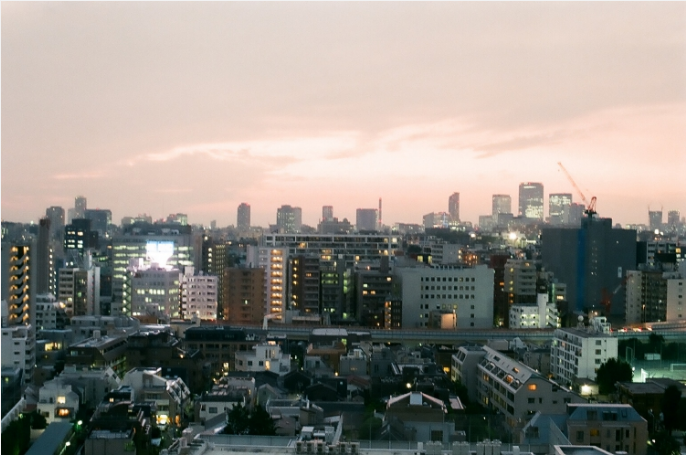
holidays and seasons
Seasonal produce, festivals, holidays, there's quite a few benchmarks to notice when the seasons change.
you can dress like a weirdo
People dress well and people dress weird. It really dilates any semblance of standards regarding what's too far gone, what's inappropriate, and what's embarrassing. Forget memes about asian collectivism and groupthink and locusts or whatever, you can pull anything off in Japan. The fatalism of dressing nice to strip malls and friends' mcmansions makes me never want to return to the US.
shops
Shops exhibit tons of perverted specificity. Hobby-oriented shops in particular are so insistent in chasing customers that are just like them that their wares almost resemble prideful personal collections.
transportation
easy and painless in city centers like it should be.
convenience stores
24-hour convenience stores are everywhere if you live in a city. While a bit more expensive they're life savers. I'm quite fond of the mini grocery stores, there's some deals to be had there.
drinking
Strolling around with an open can of beer is fine and there's no restrictions on public intoxication. Starting next year alcohol consumption and sales will be banned in certain districts in Tokyo due to the rowdy tourists in Shibuya leaving trash everywhere. People drink responsibly here. In the US you'd be down on all fours cavity searched on the sidewalk by the religious police. Buying alcohol is also easier, Americans would shit their own hips out if they found out you could buy drinks on ebay. "You havin a pussy drink bro?" is less relentless in Japan, although there are some cocktails more gendered than HRT injections.
crime
crime is rare. I've accidentally left cameras and wallets in restaurants and they didn't disappear. There are of course exceptions like wealthy foreigner-ridden Roppongi or working-class Kamagasaki, but even then it's limited to trashed bathrooms or pickpocketing. The random stabbings or Floridaman headlines are something you just don't see. If you drop something people will likely prop it up somewhere visible or hand it over to a police station. You'll see countless orphaned lens caps and gloves placed on bollards. I've had relatives leave money in self-service registers and it was still there when they came back. The use of bike locks are rare outside of certain wards, some shops in Kyoto don't even have locks.
sightseeing
It's an open question why more Japanese people don't vacation overseas it's poverty but the density in domestic sightseeing locations is probably why. There's never a moment of boredom if you have the time to travel around.
internet speed
wow you actually have more than 2 telecommunications companies to choose from. Japanese home internet is reputably fast, not like I would know.
it's almost not like korea
The Zaibatsu, literally "wealthy clique" in Japanese consisted of several giant conglomerates who stick their fingers in all kinds of business. The amount of financial and cultural capital they hold is staggering and in the 90's employment at any of their banking divisions was the golden ticket to a 7-figure income.
Chaebol is the Korean equivalent, but their influence is even more prominent. The divide between employment in a big company and smaller company is much more radical in Korea, where low-paying menial labor is even more undervalued.
food
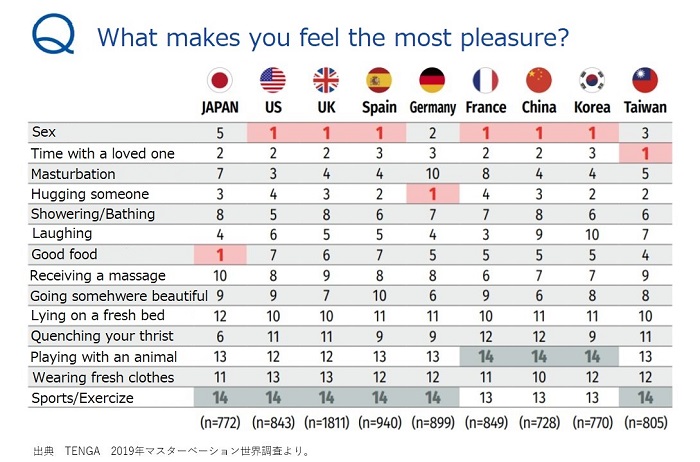 the food is great.
the food is great. Eating a plate of slop under a roof can quickly hit $15 in the US but a decent meal here is around that much. Even zero-effort meals at Sukiya are cheap and not cripplingly comatose-inducing. The initial surprise in hearing that some people never cook is understandable now. The portions are tiny, best exemplified by the toddler-sized cereal boxes. I could inhale a bag of chips in japan.
The quality of beef at normal supermarkets is staggering. Produce is also amazing, especially fruit. You also find some uncommon oddities from SE asia.
The japanese probably aren't that impressed, hence the waves in popularity of thai and indian food that use recognizably novel ingredients like lemongrass or cardamom.
food allergies seem less common overall but you hear a lot about contact and egg allergies
sweets
sweet things aren't that sweet. I went out for BBQ in the US and I was knocked catatonic by how sugary everything was. Even me who grew up destroying their insulin baseline with fundip and whoppers and candycorn and milkduds found it just too much. Good thing then that the japanese pride themselves on subtlety. goes back to the craftsmens tradition of subtle presentations, the vital bits being in the details. Sweets are refreshing, you could inhale cakes and pastries for hours without your liver bringing out the exit bag. Their use of dairy in sweets is also unparalleled. While Japan doesn't have a flourishing craft cheese industry the cream and butter used in bread and sweets are delicious.
poverty
Cheap food won't always destroy your body. There's a universal presumption in the US that cheap food is bad for you, and the inverse is also true. It explains the comorbidity of obesity and poverty, the existence of food deserts, the incestuous relationship between the federal government and agribusiness. In Japan especially inexpensive food doesn't have connotations of fast food, but central kitchens. Think sysco or school lunches. Vegetables are cheap without relying too much on underpaid transnational migrant labor. Poverty meals are interestingly soy-bean centric, from bean sprouts to natto to tofu.
business
pleasantries extends to (some)business. When out to buy green tea at a department store one of the Itoen employees referred me to their competitor across the floor. Unthinkable back home, they'd rather carbomb the competition than squander margins.
privatization
If I said privatizing nationalized companies works you'd probably have the sense to make me disappear. In this bizarro land it somewhat makes sense. The Japanese post, the subway system, there's several examples where privatization hasn't been a complete disaster.
Surprise! The Japanese Post has suspended weekend deliveries indefinitely, leaving businesses less productive, rural communities more isolated, and deliveries even more strained. Thank god shareholders got their return though.
The tokyo metropolitan subway is also set to be sold off, we're so fucked lmao
high trust
I'm a fan of a rum made from japanese brown sugar. I saw a twitter post by a distiller in Kagoshima advertizing an alcohol display at a supermarket. It was a little corner a bit like the Trader Joes booth that gives out free samples minus the captive employee. Complete with paper cups and open bottles for people to pour and sample liquor. That would not fly in the US because everyone is incentivsed differently. Bobby Orogon, a Nigeria-born comedian would often joke that back home anything that falls out of your hand is free game. That's how I imagine people think of the US. We accept the human margin, that inevitably there will be the column of deviants who won't adhere to any social etiquette, the people who smash TVs at walmart or shoot rude drivers through their own windshield. things like dashboard-mounted TVs are normal, vending machines aren't enveloped in steel cages, barriers to buying alcohol online are near-nonexistent. People are expected to take risky behavior responsibly and largely they do.
drug use
there's not much, maybe a homeopathic sprinkling from the golden triangle. It's frankly a wonder of the world that drug use precipitously declined after exiting the post-war era. In the countryside you'll still get your aluminium sheeting and iron drain grates stolen, but not by desperate addicts. The enduring antiquity-era archetypes of the dangerous countryside are not applicable here.
The US is still in the middle of an evolving synthetic narcotics crisis. Dutch police informants and journalists getting killed is no longer surprising. In Mexico cartels have begun scattering improvised landmines with guidance from former FARC militants. In Japan sometimes the elderly are rude to you.
no credit scores
slipping into a new property is easy as long as you have a stable income and a reputable job. many people don't have a credit card at all.
school violence
there's no school race wars, schools as a hub of violence tapered off in the 80's
no paid toilets
no paid toilets. must be tranquility for IBS havers
folk beliefs
lots of superstitution was wiped out during the meiji restoration. Wildlife poaching for folk medicine is a near-non entity relative to countries like Vietnam and China.
digital gambling
Online and sports gambling hasn't hit in the same meteoric impact as the US, the theropods are still kicking.
traditional dress
Traditional garments aren't some twice a year cosplay to the state onion festival, nor are they modern fodder for nationalist revivals a la qipao or hanfu.
the dangerous countryside
except for a sliver out in the tohoku region there's no minefields, superfund sites, needle parks, or other acutely hostile landscapes. I remember reading LRRP/MACV-SOG memoirs that talk about randomly laying mines in the jungle to delay pursuing NVA trackers.
reflection
Not just here but any bit of travelling is a great reiteration to why the US is the greatest country on earth. Places can be safer, ruder, more convenient, dirtier, more exciting, less diverse outdoors, more unstable, but the US is truly somewhere special that has it all. When settling overseas often means taking a 50% pay cut, nervously watching inflation rates, or enduring eternally horrible weather then you know you've got it good.
back to top ⤴
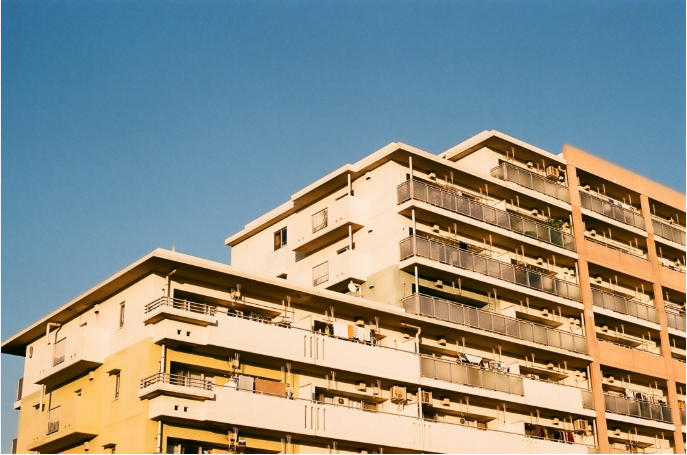
cityscapes
Some places are just too grey. Korean tourists often say Japan looks identical. Recently there's been an acceleration in bulldozing anything green in Tokyo for another microscopic parking lot or anti-homeless bench.
weather
Japan is a big country so there's a broad pick of temperature ranges. As Tokyo was formerly swampland it generally goes from 35 to 0 degrees year-round. Summers are hot. Mold is something you have to be wary about. Beware bottoms of beds and camera lenses.
the countryside
After non non biyori aired in 2013 there was a wave of impressionable 2ch posters talking about how their new countryside lifestyle fucking sucks. You'll need a car to live outside of city suburbs. A quarter of your income will go to disgusting kWh rates and kerosene to warm up your paper home. Amenities like groceries, hospitals, human interaction are distant and in short supply. Most importantly old-timers will eye you with the suspicion of a prey animal.
pests
I miss being able to lay in a patch of grass under the sun. In Japan you are an open buffet for critters, particularly mosquitos. Live on the 3rd floor+ if you want to avoid centipedes and roaches. In the countryside you have horseflies, boars, leeches, and macaques to deal with.
pesticides
Per acre pesticide/herbacide use is similar to Caribbean nations with smaller percentages of arable land. There's plenty of productive land, just no hands to willingly live in the sticks and fend off the weeds
homogenized dairy product
Despite the roasting that post-war surplus American food receives nothing is as fundamentally revolting as this. And it's everywhere. Why does this exist?
DIYing
It's difficult to find hobbyists in the city with large-scale DIY experience like carpentry (unless they've been to prison) Space is limited, neighbors have a hair trigger to noise complaints, plenty of barriers.
the country revolves around tokyo
Corporeal evidence against universal suffrage Yuriko Koike holds immense political power, far and above the other governors across the country. It's like if the US consisted only of New York and the Midwest. Despite this it's hard to say that Tokyo has any semblance of tradition or inherited identity, there's plenty to see but nothing to fall back on. The native Japanese always draw a blank when asked about famous Tokyo dishes or ingredients or holidays or festivals. Despite this the call of the void seduces youth from all over the country, not a good trend when looking at the rural-urban divide.
working
The widespread poverty dipping into famine in the 50's and the explosive baby boom through the 60's produced a very formalized on-the-rails employment cycle. Throw in multiple recessions and it all has created a risk-averse mentality for recruitment. Until the last 25 years it was unthinkable to hire full-time employees out of season or switch careers before 3 years of experience and those mores are difficult to shake. Despite the stereotype that Japanese companies hire for life full-time positions are starting to dip below 60% and many are hemorrhaging their workforce as changing careers becomes easier. Only management teams that stop looking at employees as consumables will avoid becoming another Toshiba or Panasonic.
If you want to work in japan(don't know why you would) bilingualism isn't a terribly significant advantage. It sounds like it would, and your average Japanese person will parrot that sentiment as well, hyping it up as a golden ticket out of 90 hour workweeks. For 20 years the government and big corporations have sung in unison, saying they need to be more globally-minded, yet that's always been just talk. For employers it seems like they don't really care, their desires are a smear and a blur. The desire for Japanese employees that can communicate well enough for business is so weak that many hire professional contractors to translate at exorbitant rates. There were several recruiting sites that used to take in pretty much anybody until they got swamped by new graduates lying about their language ability.
Japanese employers look for new hires seasonally on a very rigid schedule: New uni grads for top-tier companies, those switching jobs, then the rest. The majority get hired right away after graduating and if you're not within this demographic you're already considered second-tier. The system does not make concessions for foreigners. The applications, interviews, and contracts are in Japanese. If you're not fluent you're useless to any company worth working under. Second-rate companies don't offer commuting/housing stipends, visa assistance, your income will be less than $25k a year, and they will have no problems giving you unpaid overtime. These smaller companies are often headed by heavy-handed micromanagers whose behavior would be quickly extinguished at Sony or Mitsui. Normal salarymen regard their apartments as little more than hotels to sleep in. Come home at 11pm, wake up at 7am. The arudous, monotonous, or disrespected jobs are filled in with Vietnamese, Kurdish, and Burmese laborers.
careers
Name value is everything for a professional career. All you need to switch jobs is if you're competent, worked at Itochu, and have a pulse. Accrued skills being a secondary inference rather than front-and-center while whoring yourself out for recruiters. If you don't land a full-time position by 25 you're an irredeemable manchild, the bad yield of the workforce.
wages
Simply put the average American part-time worker makes the same amount as an entry-level office worker at a large japanese conglomerate. There's no HR deskmonkeys making $80k a year. The stereotype that people work like indentured slaves likely originates from the bubble era, where the average Japanese worker couldn't get rid of their earnings if they tried. Salarymen in the late 80's would clock in at 9, work until 10pm, drink with their co-workers into the morning and continue working without coming home. Work and leisure became hermaphroditic, with golf outings and dance clubs holding the same obligations as slaving away on a PC-98. The prime difference with today is that they were rolling in cash. Why sleep when you could be making big bucks? It all crumbled by 1992, to which the country was thrown into a multi-decade recession that took real estate 26 years to recover from. Suddenly the long hours were a product of necessity, a matter of nationalistic survival. By now it's just the norm, stripped of its reasoning and 50-hour minimum monthly OT quotas dot work applications like gangrenous infections.
Japan is ultimately a country in decline, fundamentally traumatized by the bubble recession rendered not even yearnful of the 80's because the wealth and social mobility felt like a distant fever dream. The government still infatuated by the ailing politics of Thatcher and Reagan continue to press the same buttons. In the early 2000's there was no consumer tax. As of 2022 the median annual income is $28,610, a figure already surpassed by South Korea whose annual GDP is 3 times smaller. That figure dropped from $42,299 in 1994. The percentage of contract and temporary employees have been exploding in number since the Bubble economy burst, further limiting those with limited opportunity to work their way up. Entry-level full-time positions, the kind that's been getting harder to get into, generally start at $20~30k a year and generally top out at $50k by the time you hit 60.
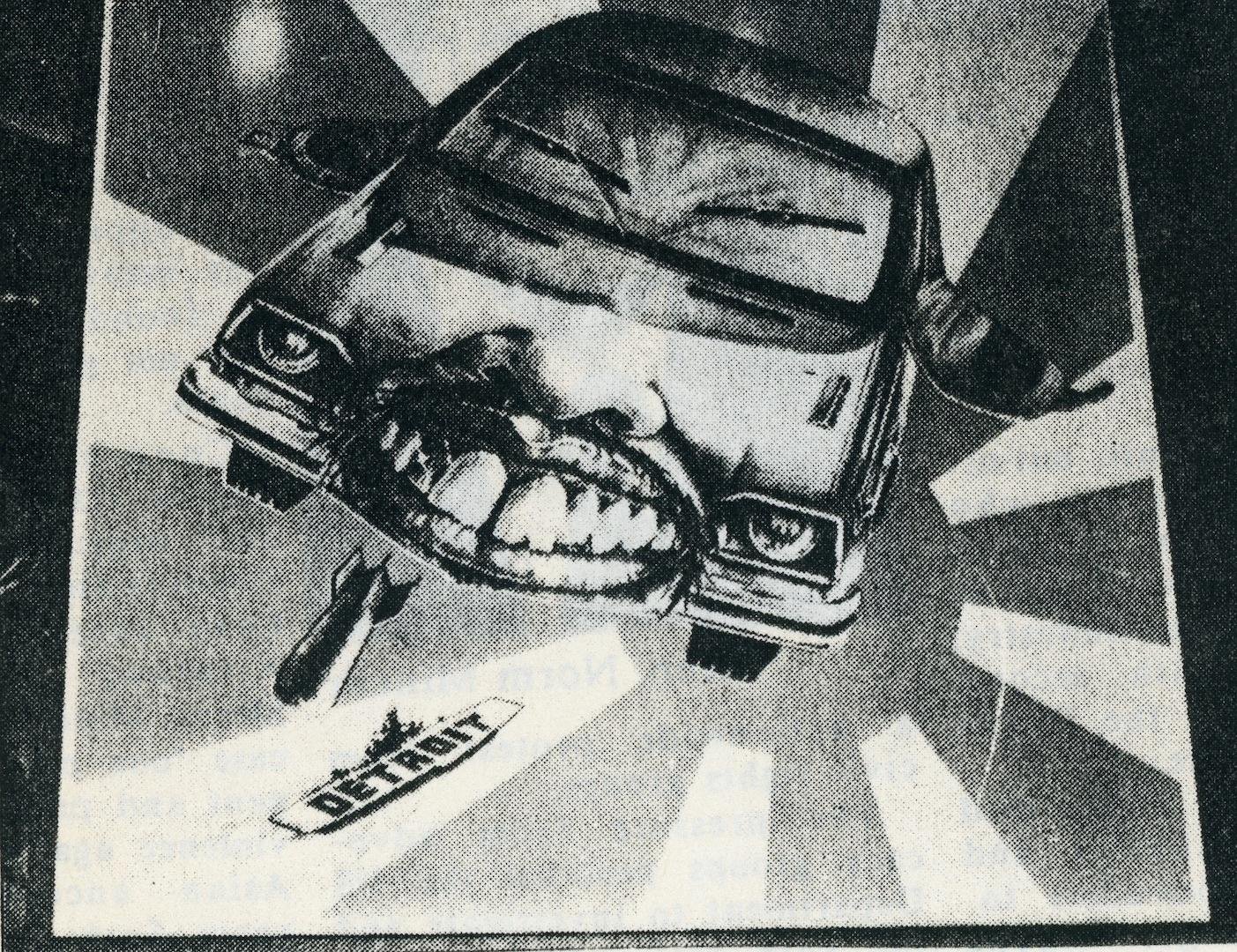 1984
1984
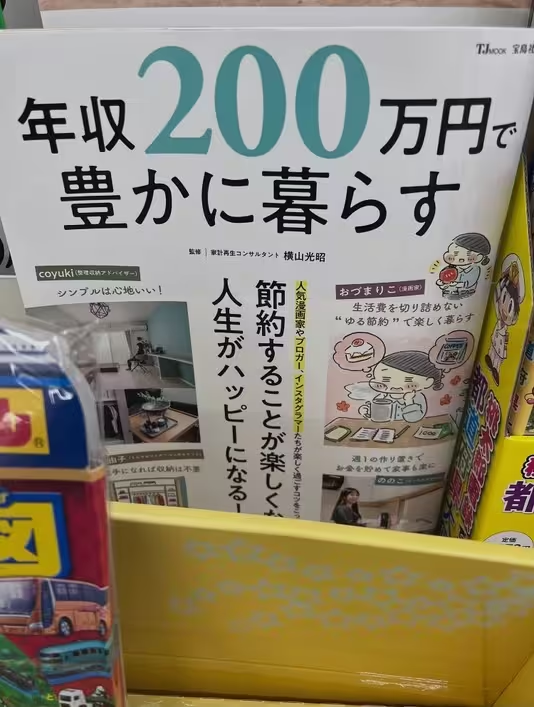 How YOU can live LUXUIROUSLY on $13,356 USD a year
How YOU can live LUXUIROUSLY on $13,356 USD a year
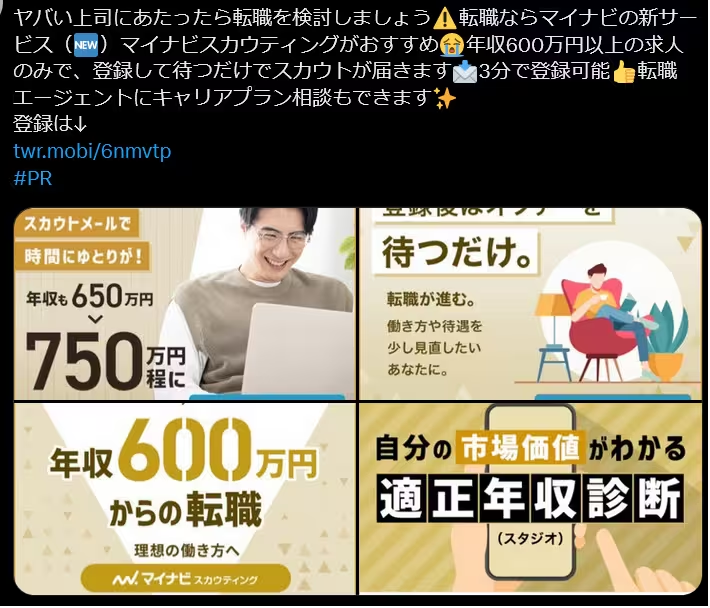 Change careers with jobs that pay $40,069 USD(gold lettering)
Change careers with jobs that pay $40,069 USD(gold lettering)
On TV there was a nostalgiabait show covering Japan's more affluent past about bowling pin attendants and smoking in orphanages and such. If there's one emblematic crumb about Japan's current standing it would be a Regain commercial, an 80's energy drink that sounds like a minoxidil derivative. Their commercials had greased-up himbos blazing through officework with an amusing jingle. The award-winning catchphrase at the end "Can you fight for 24 hours?" conceptualized when Japan's economy was at its peak with paranoid American predictions about GDP lapping was reborn after the coup de grace of 2008. Today it's been revised to "Can you fight for 3, 4 hours?" the horrible admen settling for an ambiguous, unambitious question to a placated population who knows their place.
NEETs
The number of NEETs have not changed in 4 decades while workforce shortages have been on the news for 20 years. There's either half a million or so people who are born to fall through the cracks or initiatives to increase accessibility in recruitment and combat childhood social estrangment have failed. Today there's the 50-80 problem, 50-year old NEETs suddenly facing the needs of their aging parents. From now it might just become another inevitable constant like bad weather.
poverty
34.5% of people have no assets or savings, a higher poverty rate than the US and the highest among the G7. it's not surprising that many people in Japan just can't afford to have children. Between 1994 and 2014 the median income has dropped by $10k for 35-44 year olds and $18k for 45-54 year olds. Imagine that, people have less to spend today than immediately after a country-defining recession 29 years ago. You occasionally hear people cut off from welfare die from exposure or starvation. Estimates say 2000 people sleep rough across japan. The roving bands of homeless day-laborers in Airinchiku seen in Nuclear Ginza all reached pension age and the welfare state effectively lifted them out of destitution. That won't happen again.
mindful consumption
There's plenty of companies to boycott. DHC, Muji, Uniqlo, Rakuten, Suntory, Kowa, Kirin, Negishi, APA hotels, there's no shortage of research to do before becoming a well-informed consumer.
office dress
Unlike in Korea Japan still has rigorous office dress codes. Every morning at 7 you'll see this sea of black descending on the train stations like flies to carrion. You have a bit more options if you're a woman.
phone bills
Like many things phone coverage in Japan is still firmly planted in the 90's. Along with mobile phones it was considered a luxury 30 years ago and so the high monthly bills has been carried over. It was among one of the issues highlighted by the Suga administration, an ultimately futile attempt to shake off a distinctly anti-consumer stink that the government has had since Koizumi.
cinema
The government has poured billions into the domestic movie industry as part of the outward looking "cool japan" initiative. What was the last japanese movie you watched that wasn't in monochrome? Interviews with directors are chock full of complaints about budgets that are 1/20th of hollywood.
air quality
air quality can be bad in parts. Tokyo and Kyoto are surrounded by mountains and the ardent US regulations that stem the prevalence of low cc motorbikes has no equivalent in Japan. Every year there's clouds of dust that drift from the west, a mix of pollution and soil from arid Chinese regions. Korea has it worse. It also used to be much worse 40 years ago with near-daily smog warnings issued in Tokyo. All the roadsigns showing current air quality have largely disappeared.
gamblign
Japan is legalizing casino gambling following the questionable lead of Macau, another place that peaked 40 years ago. In regards to gambling there's plenty that tread the line of legality already, from pachinko to horseracing and boat races. Gambling addiction is an already prevalent issue, pensioners lining up to spend young workers' suffocating taxes on a bit of fun.
politics
Only 40% of people voted last election, which is US levels of pitiful. On local elections they can approach single-digits. Politicians here are treasured on the same frequency as tepid yoshinoya vomit. The same political party has more or less ruled the country for 65 years.
News
Around 2009 facial paralysis enthusiast Simon Cowell got raked over in the British press after suggesting the creation of an X Factor clone for politics, covering topics like "should we be in Iraq and Afghanistan?" instead of sanctioned hate figures on the TV. No other country like Japan trots out comedians, actors, and "celebrities" as political commentators on the TV. Celebrities have been blasted for their advocacy on social issues but imagine if Louis CK, jeff dunham, and daniel iglesias was paid to do a round table on the war in sudan. When the nexus of social criticism comes from people who debase themselves for money surely it's the sign of an ailing country.
Many news channels are devastatingly shit, with some resembling clip shows with videos you would've bother uploading on youtube playing on national TV. A woman jumping backwards into a pool isn't news. A dog barking like a bird isn't news. The news is made to be as sedate and non-combative as possible, while tabloids are filled with the same sensationalist carrion peddlers as The Sun bizarrely the ones doing fearless reporting seemingly oblivious to the financial consequences. American news anchors are all journalists. Not so in Japan, where a baffling position called "news announcer" exists, something more akin to the furious-sounding KCNA presenters when it comes to rigor or agency. The sterility in presentation is actually quite jarring to witness - it often goes "look at how large this cabbage is" to "30 combatant-aged males killed in preemptive strike at an IDP camp" at breakneck speed. You will never see hard questions in an interview. You will never see career politicians be interviewed. Yet like any bored child, the news often throws tantrums to bring attention on itself. It was Asahi Shinbun, one of the largest and most prestigious newspapers in Japan, that peddled HPV vaccine injury conspiracy theories. The government, less popular than leprosy, was very receptive and rescinded their recommendation in 2013. Right now the HPV vaccination takeup rate for young women is a staggering 0.7% leading to 3000 extra deaths from cervical cancer annually, parents making the critical mistake of trusting the news. It's almost insulting in the way that genuine social issues are overshadowed by some eye-catching road rage incident or thinly-veiled ads on the news. In 2021 Japan dropped 4 places in the Reporters Sans Frontières press freedom ranking to 71st, placing it above Liberia but below Hungary and Kenya.
police
NHK special on police corruption, a rare show of self-inflicted institutional damage. 3 workers at a small business were arrested for exporting industrial spray dryers to China. Under the Public Safety Agency's massaged definitions the simple spray dryers sold by the company was framed as having the capability to produce aerosolized biological weapons. They later lied to workers that the spray dryers in question were already being used for Chinese military use. One investigator testified that they were repeatedly told "who's going to take responsibility if the investigation falls apart?" by the agency. Incredibly the show got access to internal government communications, commerce officials telling public safety agents "please wait, please cool down" while jointly cooperating during the 3-year investigation. The 3 suspects were released without charge after 16 months in custody, 1 worker falling ill and passing away during that time. A subpoenaed investigator testified with "well, it was a fabrication." It's truly got it all. testimony falsification, suspect intimidation, nothing has changed. a twitter post reads "how do these people keep on living without slitting their stomachs?
an elderly woman in her 70's was arrested and held for 3 days for stealing inarizushi(300 yen) until Saga prefectural police learned it was given to her by a friend.
collectively it seems like your civil rights only extend to what orifice they can't explore. You are considered guilty until proven innocent by investigators, juries, and defense lawyers. Stop-and-frisk is a common sight. Accused of molesting someone on the train? Take your chances on a suspiciously high conviction rate. Accused of murder? Prepare your confession under duress. Bike cops look like power rangers though, so that's a plus. And you'll ejaculate during your hanging, so you'll have that to look forward to.
driving
being a car enthusiast is easier in the US due to some arduous smog laws that encourage new car sales. For the most part it's a sea of kei cars and mopeds without mufflers. Vintage cars older than 30 years on the road are a bit of a rarity. You can oogle at all the Skylines and Supras in the world though. I also spotted a Hakosuka in kichijoji.
Driving evaluations cost $2000+ and generally span multiple days. Living on-site at dorms is common. Driving instructors used to be the kind of job where berating clients was the norm and some of that is still around despite the precipitous decline in car ownership.
old men
men over the age of 35 are demonised and for good reason. young women and ossans are the retail worker's persona non grata. It seems like a sizable population is boiling with rage, eager to be the corrective "that guy" during minor misunderstandings or etiquette violations. It's further exemplified by the perceived lack of real issues that arguably people should feel indignant over. Instead cashiers handling the tops of cans or people standing in front of doorways regularly attracts the fury of ossans. Don't be surprised when your suitcase gets angrily kicked on a packed train. It's not quite the same as karenitis, these interactions are less about personal affronts or entitlement but a general lack of forgiveness. A cashier paid $6/hour handled the neck of this can of coffee. big deal.
There's plenty of precautionary figures, people you don't want to become. The kind of miasma that brings an air of evasive thinking as you nervously climb the indeterminate ropes of adulthood. Right now the flavor of the month archetype is the over 40's man, pounded raw by the recession and in the middle of a career plateau lashing out at strangers.
generational crises
As usual the questions about a shrinking middle class or dropping full-time employment is distorted into accusations towards the youths. "Why don't youngsters gamble or drink anymore?" is a sentiment often seen on the news, the National Tax Agency recently promoting alcohol consumption among under 30's to boost tax revenue. One of the government initiatives to combat birthrates was to ask the question "How do we push women to marry lower-income partners?"
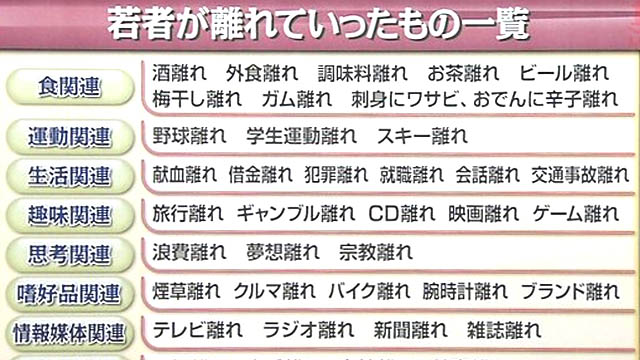 young consumers' estrangement from: alcohol • eating out • tea • gum • baseball • skiing • debt • crime • talking • car accidents • traveling • gambling • CDs • movies • organized religion • smoking • driving • watches • brand goods • TV • radio • newspapers
young consumers' estrangement from: alcohol • eating out • tea • gum • baseball • skiing • debt • crime • talking • car accidents • traveling • gambling • CDs • movies • organized religion • smoking • driving • watches • brand goods • TV • radio • newspapers
With downward trending everything it's a common view among wippersnappers that the elderly are at the very least an economically privileged cohort. It's not uncommon to see over-65s on the TV using their monthly pensions on something derisible like horse races or pachinko when they're not busy running people over with their cars. That sort of generational animosity is the populist half of support that crackpot yale profs who suggest mass suicide enjoy (the other half being multinationals and broadcasting agencies who propel those fuckers into the public eye). At the same time there's a growing visible cohort of elderly working menial part-time jobs that didn't exist 15 years ago and 44% of single elderly women are in poverty.
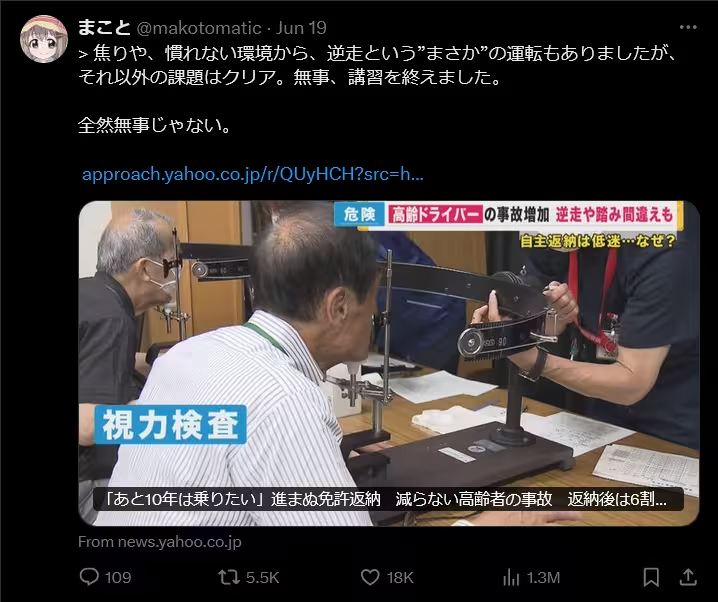
['I'd like to continue driving for 10 more years' The number of surrendered licenses and elderly driver-related car accidents at a standstill]
"Possibly from nervousness and unfamiliarity, there was an incident of driving backwards but he passed the evaluation without any problems."
"without any problems?"
sympathy
The Japanese can be selectively heartless. Many were united in breath of their criticism of ISIS captives, arguing that it was their personal matter, their responsibility for heading to a warzone. In the US the families of hostages are more or less sacralized among the public like gold star families. Nurses tweeting that they were unwilling to die for their patients during covid was a common sight, considerations about pay or working conditions not even in their heads.
 Around this time there's a lot of graduates coming to meet their former teachers. Honestly, as a school admin worker the extra work is a pain. Do teachers really enjoy meeting with their students?
Around this time there's a lot of graduates coming to meet their former teachers. Honestly, as a school admin worker the extra work is a pain. Do teachers really enjoy meeting with their students?
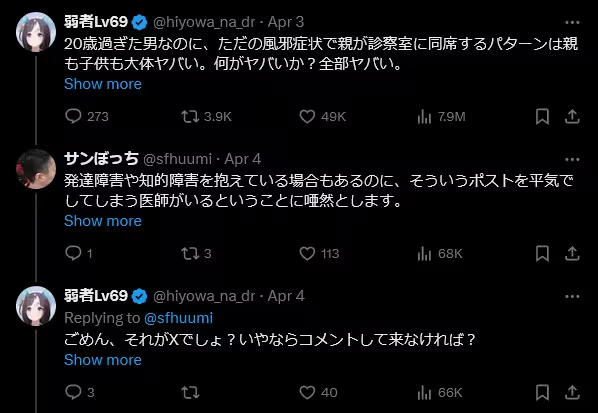
It's fucked when men over 20 come in with their parents for evals when they just have a cold, both of them.
I am stunned that there are doctors who are willing to make posts like this even though the patients may have developmental or intellectual disabilities.
Sorry isn't that was X is for? If you don't like it maybe you shouldn't make a comment towards me?
the common outsider narratives of some inwards national solidarity and outwards hostility doesn't really ring true. Just go to Kyoto, japanese or not. Kyoto of course being the sacrificial anode for tourism like okinawa is to the defense ministry.
mexican food
there's like 2 mexican resturaunts
thrift stores
Thrift stores don't exist. Instead a healthy second-hand industry with chains like hard-off and 2nd Street are all over. There's no staggering deals to be had, just typical second-hand prices.
vices
You can grow tobacco but processing (drying, curing, shredding) is illegal. Homebrewing and distilling is illegal. In my parents' generation the village council would loudspeaker, "The police will be arriving in an hour to look for illegal stills. Let's all cooperate with their investigation," with a wink.
scams
Scams targeting the elderly are everywhere. The ringleaders usually fly out to operate out of Thailand or the Phillipines, which I'm sure is great PR for the Japanese.
electricity
Power is Italy-levels of expensive, another reason why EV uptake has been slow and crypto mining non-existent. Nuclear somehow has the highest kwH rates of any source and the weekly news about deferred maintenance and human fuckups contextualizes the enduring opposition beyond 2011 and godzilla movies. 3Sv/h measured outside reactor containment vessel? 360 critical components in uranium enrichment facility uninspected for 23 years? the news commentators are posing the question "is tritiated water safe to drink?"
more pain
back to top ⤴
